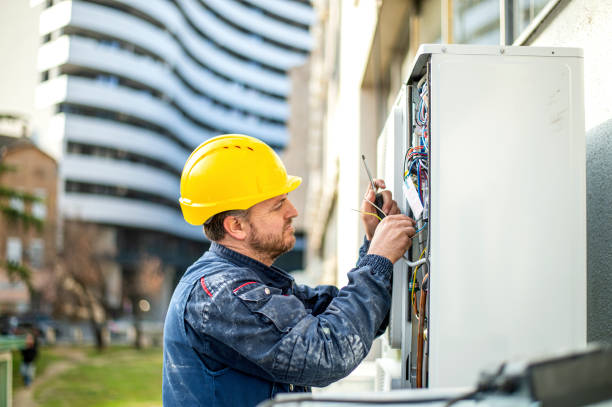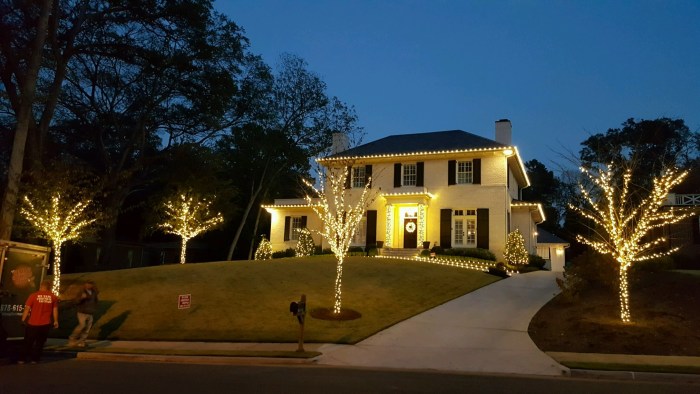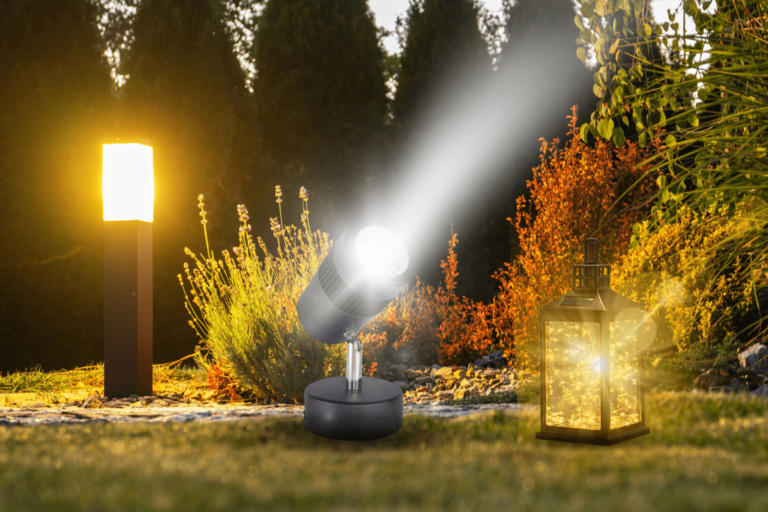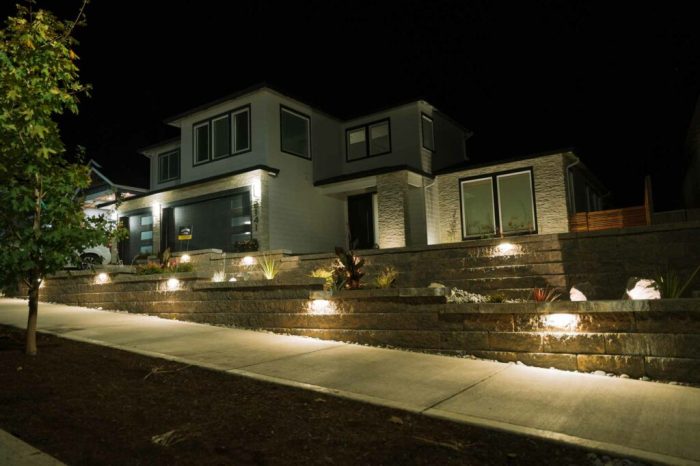Landscape Electrician Near Me Expert Outdoor Solutions
A landscape electrician near me is crucial for safe and efficient outdoor electrical installations. This guide explores the specialized skills, service areas, and common projects handled by landscape electricians. We’ll cover everything from understanding the unique requirements of outdoor electrical work to finding trusted professionals in your area and estimating costs.
From illuminating pathways to powering outdoor appliances, landscape electrical systems are essential for enhancing your property. This comprehensive overview will provide you with the knowledge and resources to find the right landscape electrician near you, ensuring your outdoor electrical needs are met safely and efficiently.
Defining Local Electricians

Source: electrical-pros.com
A landscape electrician is a specialized professional who installs, maintains, and repairs electrical systems within outdoor settings, such as parks, gardens, and commercial landscapes. Their expertise extends beyond residential or commercial buildings, encompassing unique challenges presented by the outdoor environment. They possess a deep understanding of electrical safety protocols tailored to the specific conditions of outdoor work.
Landscape Electrician Definition
A landscape electrician is a licensed professional specializing in outdoor electrical systems. They possess extensive knowledge of electrical codes, grounding techniques, and safety procedures specific to the unique demands of the outdoor environment. Their work often involves installations for lighting, irrigation systems, and other landscape features.
Unique Skills and Knowledge
Landscape electricians must possess a strong understanding of electrical principles, including circuit design, load calculations, and safety protocols. Crucially, they need to understand the specific challenges of outdoor environments, such as weather-resistant materials, grounding considerations, and protection from moisture and extreme temperatures. They also need experience in dealing with different types of outdoor lighting, irrigation, and other landscape features.
Difference from General Electricians
While both landscape and general electricians work with electricity, the focus and required skills differ significantly. General electricians primarily focus on indoor electrical systems within buildings. Landscape electricians, on the other hand, concentrate on outdoor installations, often involving specialized equipment and safety considerations related to weather, water, and ground conditions.
Tools and Equipment
Landscape electricians utilize a variety of tools and equipment tailored for outdoor use. This often includes insulated tools for working with energized lines, weather-resistant cable and connectors, and specialized grounding rods and equipment. General electricians, in contrast, typically use tools suited for indoor work, such as drills, wire strippers, and various meters.
Safety Precautions in Outdoor Electrical Work
Outdoor electrical work demands meticulous adherence to safety protocols. The primary safety concerns include weather conditions, potential water exposure, and the possibility of accidental contact with energized lines. Thorough grounding procedures, use of appropriate safety gear (like insulated gloves and boots), and adherence to strict safety guidelines are paramount. Regular inspections and maintenance are crucial for mitigating potential hazards. For example, during a storm, downed power lines are a significant concern, highlighting the importance of landscape electrician knowledge in assessing and mitigating such risks.
Service Areas and Geographic Coverage: Landscape Electrician Near Me

Source: gopro-electric.com
Landscape electrical services are crucial for enhancing the aesthetic appeal and functionality of outdoor spaces. These services range from illuminating pathways and gardens to powering irrigation systems and specialized features. Understanding the geographic areas where such services are most frequently required and the types of projects needing electrical work is vital for landscape electricians to effectively serve their clients.
Common Geographic Areas for Landscape Electrical Services
Residential and commercial properties in areas with expansive outdoor spaces, such as suburban neighborhoods, parks, and golf courses, frequently require landscape electrical services. The need for such services is also prominent in areas with a high concentration of luxury homes and estates. Furthermore, regions experiencing growth in outdoor recreation and entertainment often see a rise in demand for outdoor lighting and electrical infrastructure.
Types of Landscaping Projects Requiring Electrical Work
Landscape electrical services are essential for various landscaping projects. These projects may include the installation of outdoor lighting, irrigation systems, fountains, water features, and security systems. The integration of automated lighting systems and smart technology is increasingly prevalent in modern landscaping designs.
Examples of Outdoor Lighting Installations
Numerous outdoor lighting installations enhance the visual appeal of landscapes. Pathway lighting creates safe and inviting walkways. Accent lighting highlights specific features like trees, sculptures, or architectural elements. Flood lighting illuminates larger areas, providing security and ambiance. String lights and lanterns offer a warm and inviting atmosphere for patios and outdoor gatherings.
Factors Influencing the Service Area of Landscape Electricians
The service area of a landscape electrician is often influenced by factors such as the electrician’s expertise, the availability of qualified personnel, and the demand for these services in specific geographic locations. Additionally, the availability of permits and regulations governing landscape electrical installations plays a role. The proximity to specialized equipment suppliers and the capacity for efficient transportation to job sites also influence the range of service areas.
Table: Service Areas and Corresponding Service Types
| Service Area | Service Types |
|---|---|
| Suburban Residential Areas | Outdoor lighting, irrigation system upgrades, automated lighting control systems, security lighting, pathway lighting |
| Commercial Properties (Parks, Golf Courses) | Extensive lighting systems, irrigation systems, automated control systems, and specialized lighting for events |
| Luxury Estates and Homes | High-end lighting installations, elaborate water features, automated irrigation systems, security systems, and complex lighting control systems |
| Recreational Areas | Lighting for parks, playgrounds, and sports fields; lighting for outdoor events and entertainment areas; safety lighting |
Types of Electrical Work in Landscaping
Landscaping electrical work encompasses a wide range of projects, from simple pathway lighting to sophisticated home automation systems. Properly designed and installed systems enhance the aesthetic appeal, safety, and functionality of outdoor spaces. This section explores common landscape electrical projects, focusing on lighting, outlets, and integration with home automation.
Common Landscape Electrical Projects
Landscape electrical projects often involve a variety of tasks. These projects can range from basic outdoor lighting installations to complex systems integrating with home automation. Careful planning and execution are essential to ensure the safety and longevity of the system.
- Outdoor Lighting Installations: These range from simple pathway lights to elaborate accent lighting schemes. Proper placement and wattage are critical to avoid harsh glare or insufficient illumination.
- Electrical Outlets for Outdoor Appliances: Installing outlets for grills, fountains, or other outdoor appliances is crucial for convenience and usability.
- Integration with Home Automation Systems: Connecting outdoor lighting and other appliances to smart home hubs allows remote control, scheduling, and energy efficiency.
- Security Lighting Systems: These systems often employ motion sensors to illuminate specific areas, deterring potential intruders and enhancing safety.
- Landscape Feature Lighting: Lighting designed to highlight specific landscape features, such as trees, water features, or sculptures, enhances visual appeal.
Outdoor Lighting Systems
Outdoor lighting systems come in diverse forms, each serving a specific purpose and aesthetic. Choosing the right type of lighting is crucial for achieving the desired ambiance and functionality.
- Pathway Lights: These are typically low-voltage fixtures, often LED, strategically placed along walkways to ensure safe navigation at night. They come in various styles, from simple bollard lights to more elaborate fixtures.
- Accent Lights: These fixtures are used to highlight specific landscape elements, such as trees, sculptures, or architectural features. They can create dramatic effects and add depth to the outdoor space.
- Flood Lights: Flood lights provide broad, intense illumination, often used for security or illuminating large areas like patios or driveways. Their high intensity can be problematic in residential areas, as they might disrupt the surroundings. Carefully considering the placement is crucial.
- String Lights: These are decorative lights used to create a festive or ambient atmosphere. They come in various colors and styles and are frequently used for events or adding a touch of charm to the landscape.
Electrical Outlets and Wiring for Outdoor Appliances
Properly installed outlets and wiring for outdoor appliances are essential for safety and functionality. Specific considerations for outdoor electrical systems are critical to prevent damage or malfunction.
- GFCI Outlets: Ground Fault Circuit Interrupters (GFCIs) are required for outdoor outlets to prevent electrical shocks. Their design ensures the safety of users by detecting ground faults.
- Weatherproof Enclosures: Outdoor outlets and wiring must be housed in weatherproof enclosures to protect them from moisture, rain, and extreme temperatures.
- Outdoor Appliance Wiring: Outdoor appliances like grills, fountains, and spas require specific wiring and outlet types. Understanding these requirements is crucial for proper installation.
Integration with Home Automation Systems
Integrating landscape electrical systems into home automation systems offers advanced control and convenience. Homeowners can now control their outdoor lighting and appliances from their smartphones or tablets.
- Smart Lighting Controls: Smart lighting systems allow for remote control, scheduling, and dimming of outdoor lights, offering flexibility and energy efficiency.
- Automated Irrigation Systems: Integrating irrigation systems with home automation enables scheduled watering based on weather conditions, reducing water waste.
- Security System Integration: Connecting security lights and cameras to the home automation system provides centralized control and monitoring.
Comparison of Outdoor Lighting Types
| Lighting Type | Functionality | Application |
|---|---|---|
| Pathway Lights | Safe navigation at night | Walkways, driveways |
| Accent Lights | Highlighting landscape features | Trees, sculptures, and architectural details |
| Flood Lights | Broad, intense illumination | Patios, driveways, and security |
| String Lights | Decorative, ambient lighting | Events, festive ambiance |
Finding Electricians Near You

Source: artplumbingandac.com
Locating a qualified landscape electrician in your area is crucial for ensuring safe and efficient installations and repairs. This section provides various methods for finding suitable professionals, focusing on reliable online resources and essential considerations for making informed decisions.
Finding the right electrician for your landscaping project requires careful research and consideration. Different methods exist for identifying qualified professionals in your area, and this section details these methods, ensuring you make an informed choice.
Methods for Locating Landscape Electricians
Various methods are available for identifying landscape electricians in your area. Direct inquiries to local businesses and referrals from trusted contacts can yield results. However, online resources often provide a more comprehensive and accessible approach. Exploring online directories and review platforms can provide valuable insights into potential candidates.
Online Resources for Finding Electricians
Online platforms offer a vast array of resources for locating electricians. This includes specialized websites dedicated to electrical contractors, general online search engines, and industry-specific directories.
- Specialized electrician directories provide detailed information about electricians, including their areas of expertise, licensing, and customer reviews. These resources often cater specifically to landscape electrical needs, which is beneficial for your project.
- General search engines like Google allow users to search for electricians near their location. This approach yields a wide range of results, but thorough vetting is necessary to ensure the electrician’s qualifications and reliability.
- Industry-specific directories or online forums often list qualified electricians. These resources may be invaluable for identifying local electricians specializing in landscape electrical work.
Examples of Online Platforms Used for Electrician Searches
Numerous online platforms facilitate electrician searches. Examples include Yelp, Angie’s List, and specialized electrician directories. These platforms often feature profiles with contact information, reviews, and service details.
- Yelp and similar review platforms often feature ratings and reviews from past clients. These platforms can provide valuable insights into the quality of work and customer service provided by the electrician.
- Specialized electrician directories provide comprehensive profiles, often highlighting specific skills and experience in landscape electrical work. These directories can offer detailed information on each electrician, enabling a better understanding of their qualifications.
Checking Electrician Licenses and Certifications
Verifying an electrician’s license and certifications is essential for ensuring compliance with local regulations and professional standards. Unlicensed electricians pose significant risks, including potential safety hazards and legal ramifications.
- Electricians should hold valid licenses and certifications issued by the relevant local authorities. These licenses demonstrate compliance with safety standards and professional ethics.
- Checking licenses is a crucial step in verifying the legitimacy and qualification of the electrician. Failure to do so could expose you to significant risks.
Importance of Client Reviews and Ratings
Client reviews and ratings provide valuable insights into an electrician’s performance and reliability. Positive reviews often indicate exceptional service and workmanship.
- Client reviews and ratings offer a valuable insight into an electrician’s service quality and reliability. A significant number of positive reviews often suggests a reliable and experienced professional.
- Negative reviews should be carefully analyzed to understand potential issues. Thorough review analysis can help identify possible red flags and ensure you make an informed choice.
Comparison of Online Platforms for Finding Electricians
A comparative table is provided to aid in evaluating different online platforms for finding electricians.
| Platform | Strengths | Potential Weaknesses |
|---|---|---|
| Yelp | Extensive user reviews, easy search | Potential for biased or inaccurate reviews |
| Angie’s List | Verified contractor profiles, detailed service descriptions | Potential for inflated ratings or limited visibility for newer electricians |
| Specialized Electrician Directories | Focus on landscape electrical expertise, which often features detailed profiles. | May have fewer reviews compared to general platforms |
Estimating Costs and Pricing

Source: richr.com
Getting accurate estimates for landscape electrical work is crucial for both homeowners and contractors. Understanding the factors influencing costs allows for realistic budgeting and prevents unpleasant surprises. This section details the key elements that shape pricing, from materials to labor, enabling informed decision-making throughout the project.
Accurate cost estimations are essential for successful project completion. Understanding the various contributing factors ensures a realistic budget, avoids unforeseen issues, and maintains a smooth project flow.
Factors Influencing Pricing
Several factors play a significant role in determining the price of landscape electrical services. These factors are crucial for contractors and clients to understand the complexity and scope of the project. Material costs, labor rates, project size, and specific requirements all contribute to the final price.
- Material costs: The price of electrical components, such as wire, conduit, and fixtures, varies based on the type and quantity required. Fluctuations in the market price of these materials directly impact the overall cost. For example, copper wire costs tend to fluctuate more than PVC conduit.
- Labor rates: Electricians’ hourly rates vary based on experience, location, and demand. Experienced and highly skilled electricians generally command higher rates. Geographic location also plays a significant role; urban areas often have higher labor costs.
- Project size and complexity: The size of the project, including the number of fixtures, the length of wiring, and the complexity of the installation, significantly influences the total cost. A simple installation of a few lights will cost less than a complex system involving multiple circuits and intricate designs.
- Permitting and inspections: Obtaining permits and navigating inspections can add to the project’s overall cost. Depending on local regulations, permitting and inspection fees can vary significantly.
- Specific requirements: Specialized requirements, such as weatherproofing or using specific types of wire for harsh conditions, increase the cost. Installation in a damp environment or involving high-voltage circuits will likely incur higher costs.
Sample Pricing Structure
A sample pricing structure for common landscape electrical jobs provides a general guideline. However, remember that these are estimates, and actual costs may vary depending on the specifics of each project.
- Simple landscape lighting installation (up to 5 fixtures): $500-$1500
- Automated irrigation system with integrated lighting control: $2000-$5000
- Installation of a large-scale landscape lighting system (10+ fixtures, intricate design): $5000-$15000
- Installation of a security system with landscape lighting integration: $3000-$8000
Project Size and Pricing
The size of the electrical landscape project directly impacts the cost. Larger projects often require more labor hours, materials, and specialized equipment. This directly influences the final price. A small project with a few lights might cost between $500 and $1500, while a larger, more complex installation involving multiple circuits and intricate designs could cost significantly more.
Labor Costs and Pricing
Labor costs are a significant component of the overall price. Electricians’ hourly rates influence the final cost of the project. The number of labor hours required for a project is directly correlated to the project’s scope. Experienced electricians command higher rates. For example, installing a simple pathway light might take 2 hours, while a more intricate lighting system could take 40 hours or more.
Requesting Quotes
Various methods are available for requesting quotes from landscape electricians. This includes contacting electricians directly, using online platforms, or attending local trade shows.
- Contact electricians directly: Calling electricians or sending emails directly is a straightforward method. Be prepared to provide details about your project.
- Use online platforms: Several online platforms connect homeowners with local electricians. This can streamline the process.
- Attend local trade shows: Attending trade shows in your area can help you connect with electricians and get multiple quotes.
Estimated Costs for Common Landscape Electrical Services
The following table provides estimated costs for common landscape electrical services. These figures are approximations and may vary based on specific project details.
| Service | Estimated Cost |
|---|---|
| Landscape lighting installation (up to 5 fixtures) | $500-$1500 |
| Automated irrigation system with lighting control | $2000-$5000 |
| Security system with integrated lighting | $3000-$8000 |
| Landscape lighting design and installation (10+ fixtures) | $5000-$15000 |
Safety and Compliance
Landscape electrical work, while aesthetically pleasing, presents inherent safety risks. Proper adherence to safety precautions and compliance with local electrical codes is paramount to prevent accidents and ensure the longevity of the installations. Neglecting these aspects can lead to significant hazards, including electric shock, fire, and property damage.
Safe electrical practices are essential for both the workers and the public. Understanding and implementing these practices safeguards everyone involved in the process. Furthermore, adhering to regulations demonstrates a commitment to public safety and professional responsibility.
Essential Safety Precautions
Proper safety procedures are crucial for preventing accidents during landscape electrical work. These procedures must be followed diligently by all personnel involved. This includes careful planning, the use of appropriate safety equipment, and regular inspections. Failure to follow these precautions can lead to serious consequences.
- Insulation Checks: Regular inspections of electrical wiring and components are essential to identify any damage or deterioration that could compromise insulation. This proactive approach prevents short circuits and potential hazards. Inspecting for frayed wires, exposed conductors, and damaged insulation is critical.
- Grounding Procedures: All electrical systems in landscape settings must be properly grounded. This crucial step ensures that any stray electrical current is safely diverted to the earth, minimizing the risk of electric shock. Failure to properly ground electrical systems can have severe consequences.
- Protective Equipment: Appropriate personal protective equipment (PPE) is mandatory for all workers involved in landscape electrical work. This includes safety glasses, gloves, and insulated tools. This equipment minimizes the risk of electrical shock and other injuries.
Importance of Local Electrical Codes and Regulations
Compliance with local electrical codes and regulations is vital for ensuring the safety and legality of landscape electrical installations. These codes are established to safeguard public safety and ensure the proper functioning of electrical systems. These regulations are often based on safety research and past incidents, and their purpose is to prevent hazards.
- Code Requirements: Landscape electrical installations must meet all applicable local electrical codes. These codes specify the necessary wiring types, conduit sizes, and safety measures for various outdoor applications. Non-compliance can lead to penalties and potential safety issues.
- Local Authority: Local building departments or electrical inspectors are responsible for enforcing electrical codes. They may conduct inspections to verify compliance with regulations. Consulting with these authorities before starting any work is advisable.
Risks Associated with Improper Installation and Maintenance
Improper installation or maintenance of landscape electrical systems can lead to significant risks. These include electrical shocks, fires, and equipment malfunctions. Thorough planning and execution of work are essential to mitigate these risks.
- Electrical Shock: Improperly installed or maintained systems can create pathways for electrical current to flow to unintended locations. This can result in a serious electric shock to individuals or animals. Adequate insulation and grounding are crucial to prevent this.
- Fire Hazards: Overloaded circuits, damaged wiring, and faulty connections can overheat and cause fires. These incidents can have severe consequences, including property damage and injuries.
- Equipment Malfunctions: Poorly maintained or improperly installed equipment can lead to malfunctions and unexpected failures. These failures can result in disruption of service and safety concerns.
Safety Equipment in Outdoor Electrical Work

Safety equipment is essential for protecting workers and preventing accidents in outdoor electrical work. Proper use of these tools reduces the risk of injury and minimizes potential hazards. This equipment protects workers from electrical shock, falls, and other hazards.
- Insulated Tools: Using insulated tools is crucial to prevent electrical shock. These tools provide an electrical barrier, safeguarding workers from contact with energized wires.
- Ground Fault Circuit Interrupters (GFCIs): GFCIs are designed to detect ground faults and immediately interrupt the flow of electricity. They are essential for outdoor electrical work to prevent electrical shock. These devices are vital in protecting against electrical hazards.
Permits and Inspections in Landscape Electrical Installations
Permits and inspections are necessary components of landscape electrical installations. These procedures ensure compliance with regulations and guarantee the safety of the installation. Obtaining permits and undergoing inspections are crucial for legal compliance and safety.
- Permitting Process: Obtaining the necessary permits from local authorities is a critical step in the installation process. These permits ensure that the project complies with local electrical codes.
- Inspection Procedures: Regular inspections by qualified inspectors ensure that the work meets safety standards. These inspections confirm that the installation complies with all applicable codes and regulations.
Safety Procedures for Different Types of Outdoor Electrical Work
Different types of outdoor electrical work require specific safety procedures to mitigate potential risks. This table articulates some essential safety procedures for various installations.
| Type of Outdoor Electrical Work | Safety Procedures |
|---|---|
| Low-Voltage Landscape Lighting | Use insulated tools, check wiring for damage, and ensure proper grounding. |
| Outdoor Power Outlets | Employ GFCIs, use proper wire sizing, and ensure conduit is correctly installed. |
| Outdoor Security Systems | Adhere to specific wiring and grounding codes, use appropriate wire types for outdoor use, and verify compliance with all relevant regulations. |
| Irrigation Systems | Separate irrigation circuits from other electrical systems, ensure proper grounding, and use appropriate wire sizing for the load. |
Customer Reviews and Testimonials
Building trust with potential clients is crucial for any business, and landscape electrical services are no exception. Positive customer reviews act as powerful social proof, demonstrating the quality of your work and the satisfaction of past clients. This section will provide how to effectively gather, display, and utilize testimonials to enhance your reputation and attract more business.
Testimonial Format
A well-crafted testimonial showcases the value proposition of your services. A sample format includes:
- Client Name: Provides context and builds credibility.
- Location: Shows geographical reach and potential for similar services.
- Brief description of the project: Gives specifics about the work performed, highlighting the scope of your services.
- Testimonial statement: The core of the review, emphasizing positive experiences and the value delivered.
- Optional: A picture of the completed work or the client, if appropriate, and with consent.
Benefits of Showcasing Customer Reviews
Customer reviews significantly impact a business’s reputation. They serve as social proof, reassuring potential clients about the quality and reliability of your services. Positive reviews can:
- Increase credibility and build trust.
- Boost conversion rates by showing potential customers the positive experiences of others.
- Encourage positive word-of-mouth marketing.
- Provide valuable feedback for improvement and service enhancement.
Gathering and Displaying Client Testimonials
Actively seeking and displaying testimonials is key to leveraging their power. Methods include:
- Directly asking satisfied clients: A simple “Would you mind sharing your experience?” email or phone call can yield valuable testimonials. Be polite and appreciative of their time.
- Utilizing online review platforms: Encourage clients to leave reviews on reputable sites like Google My Business, Yelp, or Angie’s List.
- Creating a dedicated testimonials page on your website: Showcase testimonials prominently on your website to showcase social proof.
- Including testimonials in marketing materials: Showcase testimonials in brochures, flyers, or social media posts to increase brand awareness.
Using Testimonials to Build Trust and Credibility, LandscapeElectrician Near Me
Testimonials are powerful tools for building trust. They offer a genuine perspective from satisfied customers, which is often more persuasive than marketing materials. Effectively incorporating testimonials into your business strategy involves:
- Highlighting specific positive aspects: Focus on elements that resonate with potential clients, such as exceptional service, timely completion, or cost-effectiveness.
- Ensuring authenticity: Obtain explicit permission before sharing testimonials, and never fabricate or alter any reviews.
- Displaying reviews prominently: Place testimonials in high-visibility areas of your website and marketing materials.
Positive Customer Reviews for Landscape Electricians
The following table illustrates the positive impact of testimonials.
| Client Name | Location | Testimonial |
|---|---|---|
| Mr. Johnson | Oakwood, CA | “I was very impressed with the professionalism and expertise of your team. They were able to install a complex landscape lighting system exactly as I envisioned, and the work was completed on time and within budget. I highly recommend your services!” |
| Ms. Rodriguez | Sunnyvale, CA | “The electricians were courteous, efficient, and took great care to protect my plants during the installation. They were also very helpful in explaining the system and answering all my questions. Five stars!” |
| Mr. Davis | San Jose, CA | “Our landscape lighting is stunning! The electricians did a fantastic job, and we’ve received many compliments on the new look of our property. We are very satisfied with the results!” |
Last Recap
Finding the right landscape electrician near you is easier than ever. This discussion highlights the key factors to consider, from defining the expertise of a landscape electrician to evaluating service areas and project costs. By understanding the specialized skills, safety precautions, and common projects, you can make informed decisions and ensure a safe and effective electrical system for your outdoor space. Remember to prioritize licensed and insured professionals and always check reviews to build trust and confidence.





